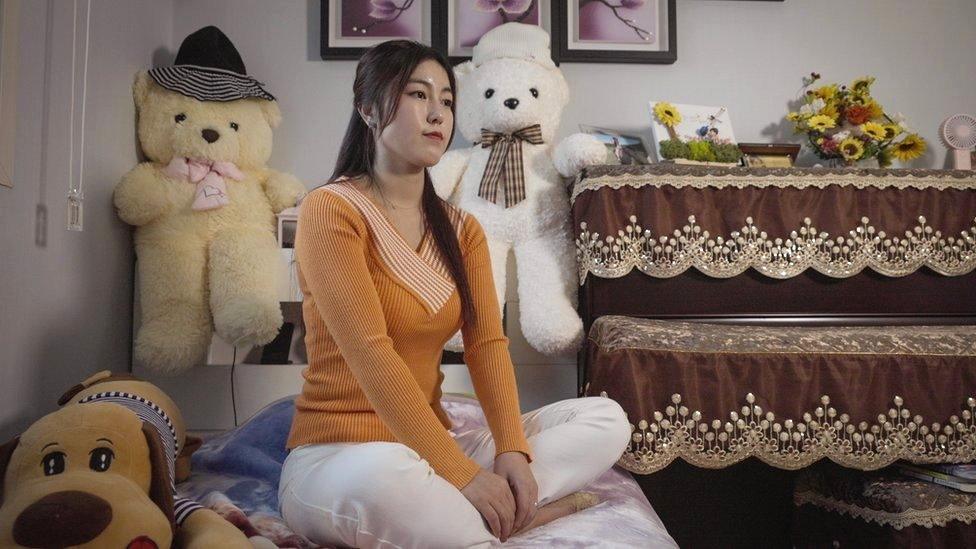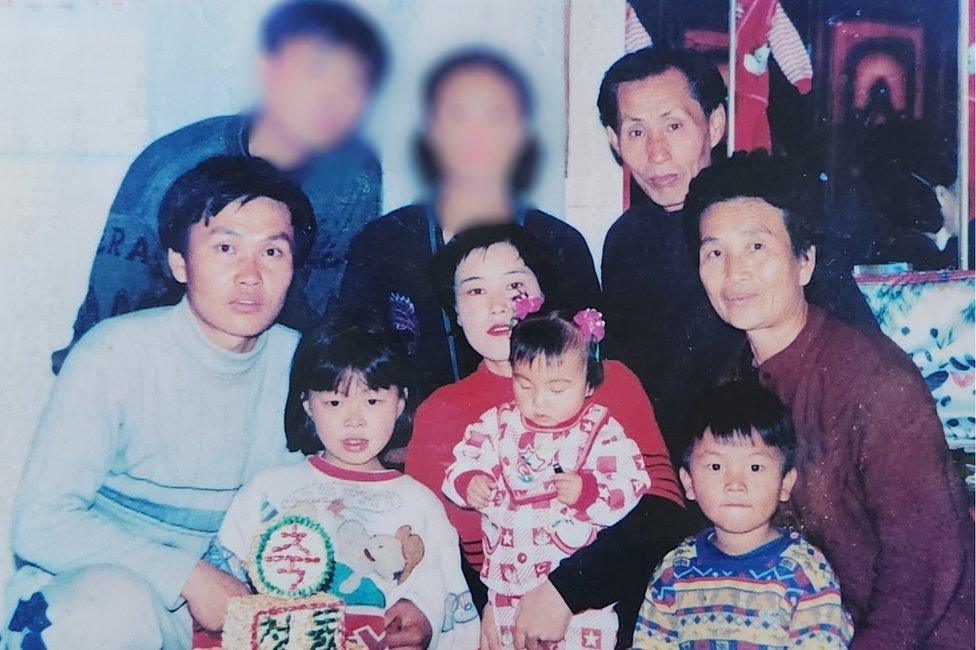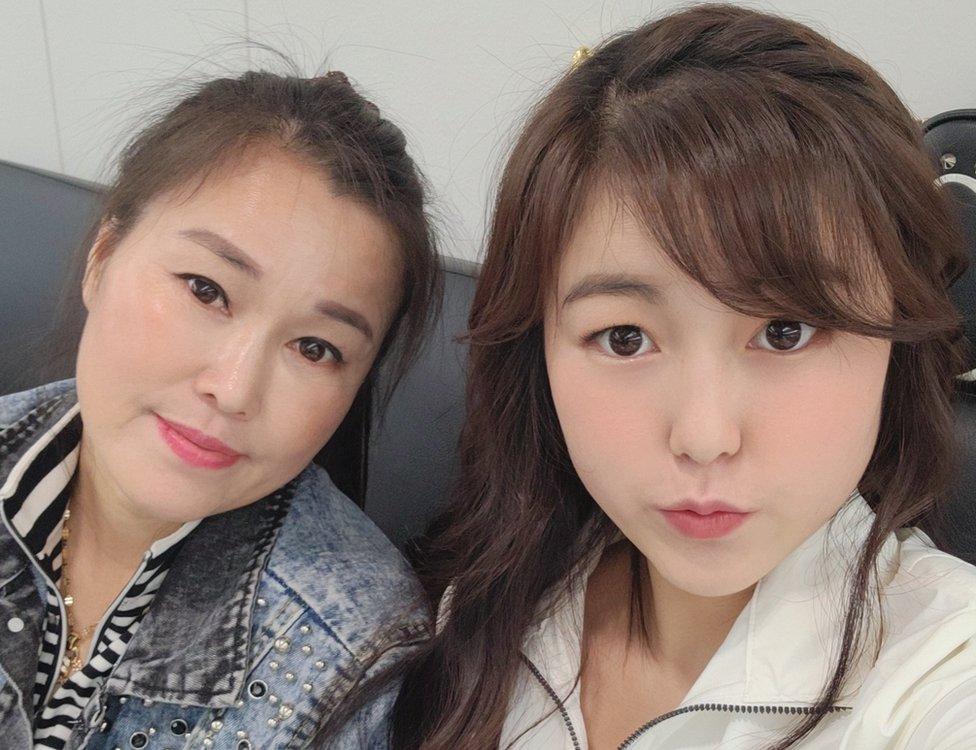The daughter who fled North Korea to find her mother
- Published

Songmi Park, now 21, is among the most recent North Korean escapees to make it to Seoul
Songmi Park dug her toes into the edge of the riverbank as she prepared to cross.
She knew she was supposed to be afraid. The river was deep, and the current looked strong. If she was caught she would certainly be punished, perhaps even shot. But she felt a pull far stronger than her fear. She was leaving North Korea to find her mother, who had left her behind as a child.
As Songmi waded through the icy water at dusk, she felt as if she was flying.
It was 31 May 2019. "How can I forget the best and worst day of my life?" she says.
Escaping North Korea is a dangerous and difficult feat. In recent years Kim Jong Un has clamped down harder on those trying to flee. Then, at the outset of the pandemic, he sealed the country's borders, making Songmi, then 17, one of the last known people to make it out.
This was the second time Songmi had crossed the Yalu River, which separates North Korea from China, providing escapees with their easiest route out.
The first time she left she was strapped to her mother's back as a child. Those memories are still as piercing as if they were yesterday .
She remembers hiding at a relative's pig farm in China, when the state police came looking for them. She remembers her mother and father pleading not to be sent back. "Send me instead," the relative had cried. The police beat him until his face bled.
Back in North Korea, she remembers her father with his hands cuffed behind his back. And she remembers standing on the train station platform, watching both her parents be transported to one of North Korea's infamous prison camps. She was four years old.
Songmi was sent to live with her father's parents on their farm in Musan, a North Korean town half-an-hour from the Chinese border. Going to school was not an option, they told her. Education is free in Communist North Korea, but families are often expected to bribe teachers, and Songmi's grandparents could not afford to.
Instead she spent her childhood roaming the countryside, hunting for clovers to feed the rabbits on the farm. She was often sick, even during summer. "I didn't eat much and so my immunity was low," she says. "But when I woke up from my sickness my grandmother would always have left me a snack on the windowsill."

Songmi with her mother as a toddler
One evening, five years after the train rolled out of the station bound for the prison camp, her father slipped softly into bed behind her, wrapping her in his arms. She buzzed with excitement. Life could begin again. But three days later, he died. His time in prison had chipped away at his health.
When Songmi's mother, Myung-hui, arrived home the following week to find her husband dead, she was distraught. She made an unthinkable decision. She would try to escape North Korea again. Alone.
On the morning her mother left, Songmi says she could sense something was different. Her mother had dressed strangely, in her grandmother's clothes. "I didn't know what she was planning but I knew that if she left, I wouldn't see her for a long time," she says. As her mother walked out of the house, Songmi curled under her bedsheet and cried.
The next 10 years were to be her toughest.
Within two years her grandfather had died. Now she was alone at the age of 10, caring for her bed-ridden grandmother, with no source of income: "One by one my family were disappearing. It was so scary."
In times of desperation, if you know what to look for, the dense mountains of North Korea can provide meagre sustenance. Every morning Songmi began the two-hour walk up into the mountains, hunting for plants to eat and sell. Certain herbs could be sold as medicine at her local market, but first they needed to be washed, trimmed, and dried by hand, meaning she worked late into the night.
"I couldn't work or plan for tomorrow. Every day I was trying not to starve, to survive the day."

Just 300 miles away, as the crow flies, Myung-hui had arrived in South Korea.
Having journeyed for a year through China and then into neighbouring Laos, then Thailand, she reached a South Korean embassy.
The South Korean government, which has an agreement to resettle North Korean escapees, flew her to Seoul. She settled in the industrial town of Ulsan on the south coast. Desperate to earn money that could pay for her daughter's escape, she cleaned the inside of ships at a ship-building factory every day without rest. Escaping from North Korea is expensive. It requires a middleman who can help to navigate the hurdles, and money to bribe anyone who gets in the way.

At night Myung-hui would sit alone in the dark and think about her daughter, about what she was doing, and what she looked like. Songmi's birthdays were the hardest. She would take a doll from the cupboard and talk to it, pretending it was her daughter, looking for some way to keep their connection alive.
As Songmi's mother recounts their time apart, from the safety of her kitchen table, she starts to cry. Her daughter strokes her arm. "Stop crying, all your pretty make-up is getting ruined," she says.
After paying a broker £17,000 ($20,400), Myung-hui was finally able to arrange her daughter's escape. Suddenly, Songmi's decade of waiting, with dwindling hope, was over.
After crossing the Yalu River into China, she kept herself hidden, stealthily moving between locations at night, afraid of being caught once more. She rode a bus over the mountains and into Laos, where she took shelter in a church, before making it to the South Korean embassy. She slept at the embassy for another three months, before being flown to South Korea. When she arrived, she spent months in a resettlement facility, which is typical for North Korean escapees. The whole journey took one year but, to Songmi, it felt like 10.

Finally reunited, she and her mother sit eating bowls of Myung-hui's homemade noodles in a spicy, cold broth.
The classic North Korean dish is Songmi's favourite. In contrast to her mother's guilt, Songmi radiates an infectious energy. She laughs and jokes as she comforts her mother, concealing any sign of her childhood trauma.
"The day before I was released from the resettlement centre, I was so nervous. I wasn't sure what I would say to my mother," she says. "I wanted to look pretty in front of her, but I'd gained so much weight during my defection and my hair was a mess."
"I was really nervous too," Myung-hui admits.
In fact Myung-hui didn't recognise her daughter, whom she had last seen when she was eight. Now she was meeting an 18-year-old.
'Why did you leave me behind?' Songmi asks her mother
"Here she was in front of me, so I just accepted this must be her," Myung-hui says. "There was so much I wanted to say, but the words wouldn't come out. I just hugged her and said, 'Well done, you've gone through so much to get here'".
Songmi says her mind went blank. "We just cried and hugged for 15 minutes. The whole process felt like a dream".
As Songmi and her mother work to build their relationship from scratch, there is one question Songmi has never mustered the courage to ask. It is a question she has asked herself every day since she was eight years old.
Now, as they slurp the remainders of their lunch, she cautiously allows the words to escape.
"Why did you leave me?"
Nervously, Myung-hui starts to explain. Their first escape had been her idea. How could she then return home from prison to live with her in-laws, reminding them every day that she had survived, when their son had died? She had no money, and could not see a way for her and Songmi to survive alone.
"I wanted to bring you, but the broker said no children," she says. "And, if we got caught again, we would both suffer. So I asked your grandmother to watch you for a year."
"I see," Songmi says, her eyes cast down. "Only one year became 10."
"Yes," her mother nods.
"That morning I left, my feet wouldn't move, but your grandfather hurried me along. He told me to get out. I want you to know, I didn't abandon you. I wanted to provide you with a better life. This seemed like the right choice."

This choice might seem unthinkable to anyone living outside North Korea. But these are the gut-wrenching decisions and risks people must take in order to escape - and it is getting tougher. The government, under the leadership of Kim Jong Un, has increased security along the border and imposed harsher punishments on those who are caught trying to escape.
Before 2020 more than 1,000 North Koreans would make it to South Korea every year. In 2020, the year Songmi arrived, the number had fallen to 229.
When the pandemic broke out early that year, North Korea sealed its borders and banned people from travelling around the country. Soldiers along the border were ordered to shoot and kill anyone they spotted trying to escape. Last year just 67 North Koreans arrived in the South, most of whom had left the North before the pandemic.
Songmi was one of the last to make it out before the borders closed. Her memories are therefore valuable, as they offer a recent and an increasingly rare insight into life inside the world's most secretive state.
She recalls how the summers were getting hotter. By 2017, the crops started to dry out and die, leaving nothing to eat between autumn and spring. But farmers were still expected to hand over the same crop yield to the government each year, which meant being left with less, sometimes nothing, to eat. They began to forage in the mountains for food. Some eventually chose to give up farming.
Those who worked in the mine, the other main source of employment in her hometown of Musan, fared worse, she says. The international sanctions imposed on North Korea in 2017, after it tested nuclear weapons, meant no-one could buy the mine's iron ore. The mine almost ceased to operate, and workers stopped receiving their wages. They would sneak into the mine at night, she says, to steal parts, which they could flog. They didn't know how to find food in the wild, like those working the land did.

Songmi spent much of her life in North Korea in Musan
But by 2019, the biggest fear, other than finding enough food to survive was being caught watching foreign films and TV programmes. These have long been smuggled into the North, and provide citizens with a glimpse of the enticing world that exists beyond their borders. Images of glamourous modern-day South Korea, portrayed in K-dramas, pose the biggest threat to the government.
"Watching a South Korean film would have got you a fine or perhaps sent to a regular prison for two or three years, but by 2019 watching the same movie would get you sent to a political prison camp," Songmi says.
She was found with an Indian film on a USB stick, but managed to convince the security officer that she hadn't known the film was on there, and escaped with a fine. Her friend was not so fortunate. One day, in June 2022, after arriving in South Korea, Songmi received a call from her friend's mother.
"She told me my friend had been caught with a copy of Squid Game, and because she was the one who had been distributing it, she had been executed," Songmi says.
Songmi's account tallies with recent reports from North Korea of people being executed for distributing foreign shows.
"It seems the situation is even scarier than when I was there. People are being shot or sent to camps for having South Korean media, regardless of their age," she says.

Adjusting to life in capitalist, free-wheeling South Korea is often a struggle for North Koreans. It is alienatingly different to anything they have experienced. But Songmi is taking it remarkably in her stride.
She misses her friends, who she could not tell she was leaving. She misses dancing with them, and the games they used to play with rocks in the dirt.
"When you meet friends in South Korea you just go shopping or drink coffee," she says, a little disparagingly.
What has helped Songmi to integrate is her steadfast belief that she is no different to her South Korean peers.
"After travelling for months through China and Laos, I felt as though I was an orphan, being sent off to live in a foreign country," she says. But when she landed at the airport in Seoul the ground staff greeted her with a familiar "an-nyeong-ha-say-yo".

The word for hello, used in both North and South Korea, blew her away: "I realised we are the same people in the same land. I hadn't come to a different country. I had just travelled south."
She sat in the airport and cried for 10 minutes.
Songmi says she has now found her purpose - to advocate for the two Koreas to be reunited. This is the future that South Koreans are told to dream of, but many do not buy into the dream. The more time passes since the country was divided, the fewer people, particularly the young, see the need for it to come back together.
Songmi visits schools to teach students about the North. She asks who among them has thought about reunification, and typically only a few hands go up. But when she asks them to draw a map of Korea, most sketch the outline of the entire peninsula, including the North and South. This gives her hope.

As Songmi settles into her relationship with her mother, there are only small glimpses of strain. The pair frequently laugh and hug, and Songmi dries her mother's tears as they explore the painful details of each other's past.
Her mother's choice was the right one, Songmi says, because they are both now living happily in South Korea.
Myung-hui may not have been able to recognise her daughter initially, but the pair look strikingly alike. Now she can see her 19-year-old self in her daughter.
Their relationship is more like a friendship or one of sisters. Songmi enjoys telling Myung-hui all the details of her dates.
It is only when they argue that it hits her.
"Then I'm like, wow, I really am living with my mother," she says, laughing.
Additional reporting, filming and editing by Hosu Lee.